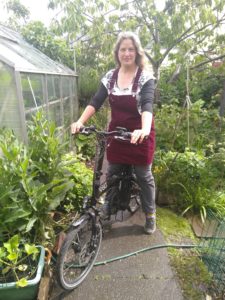By Suzi High, KT Shepherd and Laura Green
Given the close connection between the environment and the health and wellbeing of individuals and populations, it is surprising that the issue of climate change is not higher up the nursing agenda. It is often the most vulnerable in our communities who are most susceptible to the direct effects of pollution or climate change. The impact of environmental imbalance is to widen already existing health inequalities across the planet. Nurses as a professional group are often on the frontlines of tackling this, whether involved in disaster responses in flood-stricken countries or supporting increasing numbers of children with asthma in inner-city areas or other respiratory conditions.
Suzi High entered nursing from a background in ecological design. She believes that this helped her see the similarities between supporting the person and the place, the ecology within the ecology. She says “in ecological repair work we aim to support holistic wellbeing identifying the challenge for the ecology, including connections to local community and the wider environment.In nursing we do the same thing.”
KT Shepherd is passionate about enhancing quality of life care. She argues that understanding holistic nursing care means making the connection between humans and the ecological systems they inhabit. Her work on Creative Dying integrates permaculture design principles with empowering people at the end of life.
Laura Green has written about some of the creative ways that health professionals in resource-poor countries make the best use of what they have available in order to provide palliative care. Even small interventions like tackling medication waste has an ecological benefit; unused medicines cost the NHS around £300 million per year, money that could be reinvested in sustainable solutions – quite apart from the huge carbon footprint involved in pharmaceutical production and the contribution of wasted drugs to contamination of groundwater and drinking water particularly in areas with poor waste management.
In hospital nursing, the challenge involves making a space for people to rest from the causes of their ill-health, so that they can find other ways of being that might be healthier. Compassionate care, listening with kindness and setting boundaries provides a supportive and challenging space. Many modern environments are major polluters, whether through production of waste from single-use plastics or energy use. Nurses can utilise their skills in maximising efficiency to this end and ensure that practices are as sustainable as possible in their own workplaces. Nurses can also contribute to healthy lifestyles through their involvement in health promotion, encouraging walking and cycling over the use of vehicles, with clear benefits both for the individual and the environment.
Changes at a whole hospital level are of course essential – tackling waste, energy systems and transport – but there are also changes that individual nurses can make in their practices. Joining up with others, for example through the Green Nurse Network, is one way of working together to understand how best to make changes. The UK Health Alliance on Climate Change is a multiprofessional group of health professionals who campaign and advocate for the protection and promotion of public health. Health Care without Harm are an organisation established to promote environmental health and social justice.
Policy-level commitments level to tackling climate change are to be welcomed, but the inertia of developing national policies means that we need to take individual and collective responsibility as nurses to make meaningful and sustainable changes. Options for change are limited by the social and environmental structures people live in. The challenges in both types of work include the power of changing individual attitudes and the disempowerment of working within systems which don’t acknowledge connections of ecologies. People who live in areas with high car use might give up smoking but can’t give up breathing polluted air; their COPD could be exacerbated regardless of their personal actions. While we view people separate from their broader ecology, we will continue to treat the exacerbations rather than the causes of both ecological and human ill-health.
Our surroundings, including social and individual attitudes and beliefs, influence the possibility of good health and the journey to wellness. We are all part of those surroundings and this gives us the opportunity to model wellbeing. How we look after ourselves, each other and our environment has an impact. Our role as nurses includes modelling possible choices for good health and educating ourselves, our colleagues and our patients. The more we understand about creating healthy environments, the better we can do this.
Suzi High is Nursing Sister in Bradford. She has a BSc in Nursing and a BA in Peace Studies, as well as a Diploma in Applied Permaculture. She is a cyclist, gardener, bee and chicken-keeper. KT Shepherd is a Clinical Nurse Specialist in Palliative Care, and Permaculture Designer. She writes about “creative dying” and her new project explores accessing permaculture/ planet stewardship by people with chronic illness/disability. Laura Green is a cyclist, gardener, mother and palliative care lecturer at the School of Nursing, Midwifery and Social Work at the University of Manchester, and researches and writes about compassion in end-of-life care.



